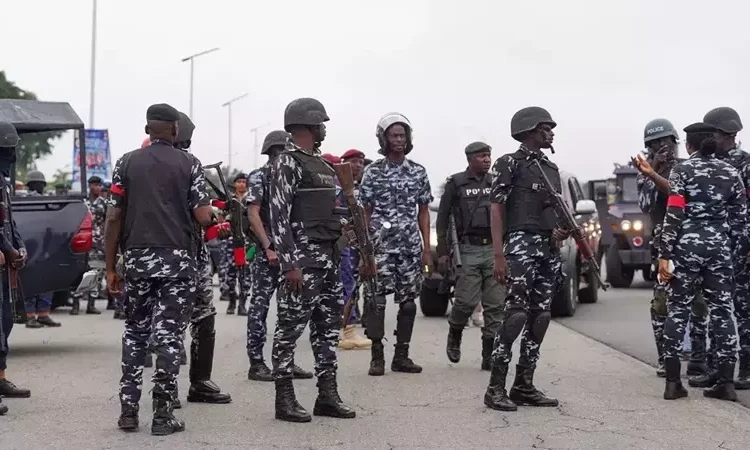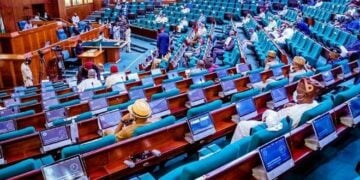Security experts have cautioned the Nigerian government and the national security agencies not to ignore the recent alarm raised by the United States Africa Command (US AFRICOM) on terrorism in the Sahel and the West African coastlines.
Security experts warn that the government cannot afford to disregard the alert, stressing the need to halt possible attacks on ports in the southern part of the country.
They also highlighted the departure of foreign forces from Niger, Chad, Mali, and Burkina Faso, which, they said, diminished coordinated responses to violent extremist organisations like Boko Haram, ISWAP and Jama’at Nusrat al-Islam wal-Muslimin (JNIM).
The extremist organisations are now exploiting the security vacuum in ungoverned spaces in the West African sub-region, Gulf of Guinea and the Sahel, they stated.
They, however, said the latest intelligence provides an opportunity for Nigeria to adopt a non-aligned approach in addressing the security threat.
The commander of the United States Africa Command, Gen Michael Langley, at the weekend, raised the alarm over growing efforts by extremist groups and terrorists in the Sahel to gain access to West Africa’s coastline.
Describing recent attacks in Nigeria, the wider Sahel, and the Lake Chad Basin as deeply troubling, Langley warned that terrorists’ access to the coast would significantly boost their capacity for smuggling and arms trafficking.
The alert comes amid an upsurge in attacks by terror gangs in security-challenged states in the country, especially Benue and Borno states.
The director of Defence Media Operations Major General Markus Kangye, did not respond to enquiries for comments on the alert raised by AFRICOM.
However, reacting to the US intel, a former director of the Department of State Services (DSS), Barr. Mike Ejiofor called on the security agencies to take a critical look at the alarm raised by the US and develop the needed countermeasures.
He cautioned that such warnings should not be swept under the carpet but reviewed at the high strategic levels.
Ejiofor said, “I’m not aware that terrorists are targeting our coastline, but I’m aware that insurgents are moving down south, even in our country, especially in the Delta, Ondo and all these southern states.
“I don’t know if they want to take over the ports. It is intelligence that shouldn’t be swept under the carpet. Our security agencies must look at it and develop countermeasures to prevent a catastrophe,” he said.
The director of media and Publicity at the International Institute of Professional Security (IIPS), Dr. Abdullahi Muhammed Jabi, said that due to the growing influence of the international community on domestic terrorism, such warnings must not be ignored.
“The government must sit down and take a hard look at it. You cannot underestimate the influence of the international community on domestic terrorism, so the government should strategically act on it, put their heads together and do their best to prevent such from happening and ensure the safety of citizens.
“Every intelligence should not be ignored; it should be looked into. We must review it and come up with our own countermeasures. Mind you, every intelligence has elements of truth, so it should be taken seriously and countermeasures developed,” he said.
On his part, a former military spokesman, Brigadier General Sani Usman (retd) said the alarm was a wake-up call for Nigeria and an opportunity to adopt a non-aligned strategy.
Describing the AFRICOM intelligence as striking, he said it was as revealing in what was omitted as in what was asserted, and it deserves further scrutiny.
According to him, the US had historically supported regional counterterrorism initiatives in West Africa, particularly through intelligence, surveillance, reconnaissance (ISR) operations and joint military training programmes such as Operation Flintlock, Obangame and African Lion.
He said, “Therefore, it could be argued that departure of U.S. forces from Niger, Chad, Mali, and Burkina Faso has undeniably diminished coordinated responses to violent extremist organisations like Boko Haram, ISWAP and Jama’at Nusrat al-Islam wal-Muslimin (JNIM), which now exploit the security vacuum in ungoverned spaces in the West African sub-region, Gulf of Guinea and the Sahel.”
Sani further said the recent resurgence of terrorists’ activities in Nigeria, especially in Borno, Benue and Plateau states, might be connected to the absence of timely, actionable intelligence, possibly once facilitated through U.S. partnerships, which have played a role in descalating attacks.
However, he said AFRICOM’s assertions seem “less about Nigeria’s security and more about reasserting U.S. strategic presence in the West African subregion, potentially even soliciting the siting of new American military bases in Nigeria, as has been touted by several persons, though denied by the Nigerian government.
“This kind of messaging, while diplomatically subtle, aligns more with U.S. strategic interests than a genuine reflection on past shortcomings.
“The claim that the U.S. provided robust intelligence support is contestable. During the peak of Nigeria’s Boko Haram insurgency, critical U.S. assistance, including intelligence, weapons and platforms, was either withheld or came too late.
“Notably, the A-29 Super Tucano aircraft, vital for close air support and counterinsurgency, arrived years after Nigeria made repeated requests and at a staggering cost.
“Worse still, these platforms were delivered with operational restrictions tied to U.S. human rights assessments, reflecting a conditional approach that undermined Nigeria’s sovereignty and urgency in responding to terror threats,” he said.
In contrast, he said Russia and China have sold arms, helicopters and military training to several African countries with fewer strings attached.
“For Nigeria, this moment is both a warning and an opportunity. While we cannot ignore the importance of U.S. expertise, intelligence, and defence capabilities that could enhance our security, we must not become overly dependent or drawn into the tug-of-war between global powers. Therefore, Nigeria must adopt a non-aligned, yet strategic foreign policy posture, forging relationships based on mutual respect and clear national interest,” he said.
Army committed to ensuring lasting peace in Benue. others – COAS
Meanwhile, the Chief of Army Staff (COAS), Lieutenant General Olufemi Oluyede, has reaffirmed the Nigerian Army’s commitment to restoring peace and stability in Benue State and other parts of the country.
He made this known during an operational visit to Benue State on Tuesday, following the widespread killings in the state by suspected armed herders.
According to a statement by the acting assistant director of Army Public Relations, 401 Special Forces Brigade / Sector 1 OPWS, Makurdi, Captain Abdullahi Osabo, the COAS on arrival was received at the Headquarters Joint Task Force, Operation Whirl Stroke (JTF OPWS), by the Force Commander, Major General Moses Gara, who presented a comprehensive briefing on the security situation.
He said the briefing highlighted key operational achievements, ongoing challenges, and troops’ continued efforts in neutralising criminal elements disrupting peace in Benue and neighbouring states.
According to the statement, the COAS, following the operational engagement, proceeded to the Government House in Makurdi, where he paid a courtesy visit to the Governor of Benue State, Rev. Fr. Hyacinth Alia.
“In a show of empathy and solidarity, General Oluyede extended heartfelt condolences to the Governor and the people of Benue over recent unfortunate incidents that resulted in the loss of lives and destruction of property in some communities,” he stated.
The COAS assured the governor of the Nigerian Army’s firm resolve to safeguard lives and property within the state.
He also emphasised the critical need for sustained collaboration among all security stakeholders to achieve lasting peace.
He further reiterated the military’s commitment to its constitutional mandate of defending the nation’s territorial integrity and supporting internal security operations.
In his response, Governor Alia expressed appreciation for the COAS’s timely visit and commended the Nigerian Army for its continued efforts, particularly the strategic deployment of troops to identified flashpoints.





